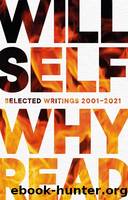Why Read: Selected Writings 2001â2021 by Self Will

Author:Self, Will [Self, Will]
Language: eng
Format: epub
ISBN: 9780802160249
Amazon: 0802160247
Goodreads: 60098160
Publisher: Grove Press
Published: 2023-01-01T08:00:00+00:00
How Should We Read?
How should we read? The S-word makes it sound, like it or not, like a moral injunction â deep, passionate and enthusiastic readers we may well be, there nonetheless remains something about the way we transform marks on a page or screen into images and ideas in the mind that leaves us feeling like failures. Modish neuroscience may provide at least some of the answers: the ability to read and write â unlike speech â isnât hard-wired into the human mind-brain, but rather, such is our neural plasticity, that weâre constantly changing in our very essence so as to refine these skills. Perhaps this is why reading always feels a little like striving â unless weâve mastered the facile trick of reading entirely for pleasure, a subject to which Iâll return.
So, thereâs always this quality of endeavour about reading â and at the same time, in cognitive terms itâs hard work. When someone reading complex passages of prose â ones, say, that attempt to convey human lives in all their manifold sensuous and intellectual complexity â is placed in an MRI (Magnetic Resonance Imaging) scanner, we can see on the machineâs visual display that almost all of their brain is lit up like the proverbial Christmas tree. Not only that, but the parts of the brain employed when actually talking, walking or making love are illuminated by the very act of reading about talking, walking or making love.
Long before such data was available, the French literary critic René Girard argued that portrayal of charactersâ behaviour and motivations in novels was just as valid a study for psychological theorists â now science seems to have borne him out. Fancifully, I imagine a reader in an MRI machine reading about a man reading . . . in an MRI machine â and I wonder how this mise en abyme might appear to the literary technicians of the future, and whether it could turn the âisâ into an âoughtâ, thereby telling us â at long last â how we should read. Because I have to confess: I no longer have that sense of security in my own methods that I once did â one which, in retrospect, I based on my empirical study of a single subject: myself.
Raised by bookish but undisciplined parents, I always felt I had just about the best introduction to reading imaginable: my American motherâs modish novels and zeitgeisty works on psychology mingling on the shelves with my English fatherâs English canonical tastes and his motley collection of philosophic texts (many of which came from my autodidactic grandfatherâs own extensive library). And there were plenty of other books as well â acquired by my brothers or me at second-hand stores and flea markets. Nobody was remotely precious about these volumes: they were there to be read, not revered. And since my parents had also decreed â in order to inculcate us with their own bookish tendencies â that we could have no television, reading was pretty
Download
This site does not store any files on its server. We only index and link to content provided by other sites. Please contact the content providers to delete copyright contents if any and email us, we'll remove relevant links or contents immediately.
| Archaeology | Essays |
| Historical Geography | Historical Maps |
| Historiography | Reference |
| Study & Teaching |
Underground: A Human History of the Worlds Beneath Our Feet by Will Hunt(12073)
Sapiens by Yuval Noah Harari(5344)
Navigation and Map Reading by K Andrew(5142)
The Sympathizer by Viet Thanh Nguyen(4370)
Barron's AP Biology by Goldberg M.S. Deborah T(4132)
5 Steps to a 5 AP U.S. History, 2010-2011 Edition (5 Steps to a 5 on the Advanced Placement Examinations Series) by Armstrong Stephen(3714)
Three Women by Lisa Taddeo(3410)
Water by Ian Miller(3166)
The Comedians: Drunks, Thieves, Scoundrels, and the History of American Comedy by Nesteroff Kliph(3060)
Drugs Unlimited by Mike Power(2579)
A Short History of Drunkenness by Forsyth Mark(2274)
DarkMarket by Misha Glenny(2200)
The House of Government by Slezkine Yuri(2188)
And the Band Played On by Randy Shilts(2178)
The Library Book by Susan Orlean(2059)
Revived (Cat Patrick) by Cat Patrick(1982)
The Woman Who Smashed Codes by Jason Fagone(1954)
The Absolutely True Diary of a Part-Time Indian by Sherman Alexie(1898)
Birth by Tina Cassidy(1892)
